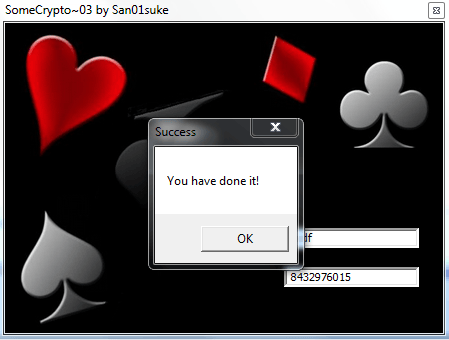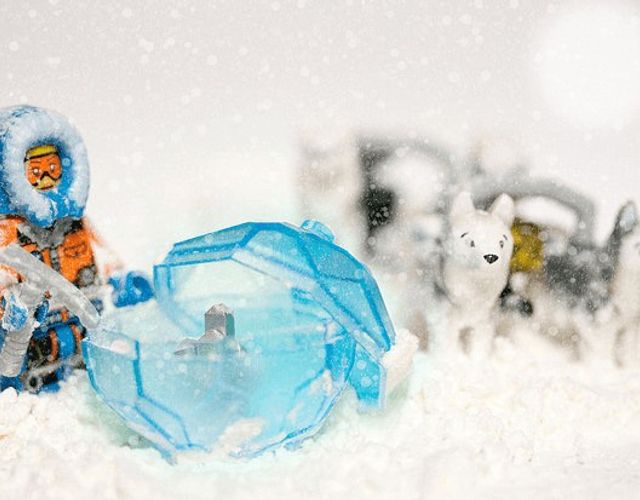Crackmes.de – san01suke's SomeCrypto~03
- August 13, 2014
- reverse engineering
- crackmes
- no comments
The author san01suke submitted three crackmes to www.crackmes.de on July 1st. This is my attempt to solve the third one, called SomeCrypto~03. You can view and download the crackme here. The short description simply says:
“Just write a valid keygen.
You should know x86 perfectly to solve this.”
- san01suke
The Disassembly
The user interface looks exactly like the one from SomeCrypto~01 and SomeCrypto~02. The disassembly and inner workings are similar to SomeCrypto~02, therefore, I’m not going into details on how to decompile the code. This is the relevant subroutine of SomeCrypto~03
-------------------------------------------------------------------------- .text:00401259 align 10h .text:00401260 .text:00401260 ; =============== S U B R O U T I N E ======================================= .text:00401260 .text:00401260 ; Attributes: bp-based frame .text:00401260 .text:00401260 sub_401260 proc near ; CODE XREF: 1DDp .text:00401260 .text:00401260 permutation = byte ptr -2Ch .text:00401260 arg_0 = dword ptr 8 .text:00401260 .text:00401260 name_length = eax .text:00401260 serial = esi .text:00401260 push ebp .text:00401261 mov ebp, esp .text:00401263 sub esp, 30h .text:00401266 push serial .text:00401267 mov serial, name_length .text:00401269 xor name_length, name_length .text:0040126B cmp [edx], al .text:0040126D jz failed ; if name empty jump .text:00401273 .text:00401273 loc_401273: ; CODE XREF: sub_401260+18j .text:00401273 inc name_length .text:00401274 cmp byte ptr [name_length+edx], 0 ; name[index] == '\0' .text:00401278 jnz short loc_401273 .text:0040127A cmp name_length, 4 ; -> name length needs to >= 4 .text:0040127D jl failed .text:00401283 xor eax, eax .text:00401285 cmp [serial], al ; if empty serial jump .text:00401287 jz failed .text:0040128D lea ecx, [ecx+0] ; ecx = 7743008E .text:00401290 .text:00401290 loc_401290: ; CODE XREF: sub_401260+35j .text:00401290 inc eax .text:00401291 cmp byte ptr [eax+serial+0], 0 .text:00401295 jnz short loc_401290 .text:00401297 cmp eax, 10 ; serial length needs to be 10 .text:0040129A jnz failed .text:004012A0 lea eax, [ebp+permutation] ; eax will hold permutation .text:004012A3 call permutation_name ; generate permutation based on name .text:004012A8 mov al, byte_403010 .text:004012AD mov byte_403080, al .text:004012B2 mov edx, 17 .text:004012B7 jmp short loc_4012C0 .text:004012B7 ; --------------------------------------------------------------------------- .text:004012B9 align 10h .text:004012C0 .text:004012C0 loc_4012C0: ; CODE XREF: sub_401260+57j .text:004012C0 ; sub_401260+79j .text:004012C0 mov cl, byte_403010[edx] .text:004012C6 mov byte_403080[edx], cl .text:004012CC lea eax, [edx+17] .text:004012CF cdq .text:004012D0 mov ecx, 103 .text:004012D5 idiv ecx ; eax = edx/103, edx = edx % 103 .text:004012D7 test edx, edx .text:004012D9 jnz short loc_4012C0 ; loop while edx != 0 .text:004012DB mov edx, offset byte_403080 .text:004012E0 lea eax, [ebp+permutation] .text:004012E3 call map_rotate .text:004012E8 mov ecx, serial .text:004012EA lea eax, [ebp+permutation] .text:004012ED call mapping_is_serial .text:004012F2 mov edx, offset byte_403080 .text:004012F7 lea eax, [ebp+permutation] .text:004012FA call map_rotate .text:004012FF encrypted_msg = edx .text:004012FF mov ecx, 67h .text:00401304 mov encrypted_msg, offset byte_403080 .text:00401309 or eax, 0FFFFFFFFh .text:0040130C lea esp, [esp+0] .text:00401310 .text:00401310 loc_401310: ; CODE XREF: sub_401260+C7j .text:00401310 movzx esi, byte ptr [encrypted_msg] .text:00401313 xor esi, eax .text:00401315 and esi, 0FFh .text:0040131B shr eax, 8 .text:0040131E xor eax, ds:dword_402060[esi*4] .text:00401325 inc encrypted_msg .text:00401326 dec ecx .text:00401327 jnz short loc_401310 .text:00401329 not eax .text:0040132B cmp eax, 72DD193Dh .text:00401330 jnz short failed .text:00401332 mov encrypted_msg, [ebp+arg_0] .text:00401335 mov eax, ds:MessageBoxA .text:0040133A push encrypted_msg .text:0040133B push offset aSuccess ; "Success" .text:00401340 push eax .text:00401341 mov ecx, offset byte_403080 .text:00401346 mov byte ptr unk_403078, 1 .text:0040134D call ecx ; byte_403080 .text:0040134F add esp, 0Ch .text:00401352 mov al, 1 .text:00401354 pop esi .text:00401355 mov esp, ebp .text:00401357 pop ebp .text:00401358 retn .text:00401359 ; ---------------------------------------------------------------------------<
The Decryption
The performed steps are almost the same as in SomeCrypto~02:
- There is a hardcoded, encrypted message at
byte_403080 - The message is first shuffled around in a static fashion, independent of the name, serial or any other input. This part does not exist in SomeCrypto~02, but it doesn’t make the problem any harder because we just need to dump the message after this routine.
- The code then permutates the message in blocks of 10. The permutation is based on the name field.
- The resulting message is then permutated once more, this time the mapping corresponds to the serial input. Both the name and the serial permutation are calculated as in SomeCrypto~03, except this time the block size is 10 Bytes rather than 7.
Here’s a visualization of the different steps:
+-----------+
| encrypted |
| message |
+-----------+
|
V
+---------------+
| static |
| scrambler |
+---------------+
|
V
+-------------+
| permutation |
| based on |
| name |
+-------------+
|
V
+-------------+
| permutation |
| based on |
| serial |
+-------------+
| <--- I dumped the message here for
V name: asdf
+-----------+ serial: 0123456789
| plaintext |
+-----------+
The Crack
The steps to crack this problem are the same as in SomeCrypto~02:
- Find out which permutation generates the correct plaintext from the encrypted message (after it was shuffled around).
- Given the correct permutation, write a keygen that gives serials which – combined with the permutation of the name – produce the desired permutation from step 1.
In SomeCrypto~02 the desired plaintext was pretty obvious, because it was an English sentence encoded in ASCII. This time, most bytes are not ASCII characters (at least not printable ones that is). Heres a dump of location 403080 (the message) just before the correctness check in line 004012FF. I used the name asdf and serial 0123456789:
EC EC 83 EC 59 45 C6 55 8B 14 C6 C6 6F ED 45 75 EE C6 45 45 F1 F0 45 C6 61 45 C6 EF 20 68 C6 C6 76 F2 45 65 F3 C6 45 45 F6 F5 45 C6 6F 45 C6 F4 20 64 C6 C6 6E F7 45 65 F8 C6 45 45 FB FA 45 C6 74 45 C6 F9 20 69 6A C6 21 FC 00 00 FD C6 45 45 8B 8D 50 0C 55 51 EC 8B 45 4D 8B 08 55 FF E5 10 C4 10 52 83 5D C3 55
So if the message isn’t text, what is it? Looking at the code at the end of the snippets reveals the purpose of 403080:
.text:00401341 mov ecx, offset byte_403080 .text:00401346 mov byte ptr unk_403078, 1 .text:0040134D call ecx ; byte_403080
The message isn’t text, but an executable subroutine! In other words: the correct permutation will generate a sequence of bytes that can be disassembled into meaningful code. While it was easy to guess the correct permutation for the English sentence from SomeCrypto~02, this task is much harder because it isn’t obvious what sequence of bytes produce reasonable disassembly. However, there are certain constructs that many subroutines share, e.g., the function prologue and epilogue. This is the common function prologue:
The usual prologue is:
55 PUSH EBP 8B EC MOV EBP, ESP 83 EC <nr> SUB ESP <nr>
Let’s compare that with the first block of our message:
0 1 2 3 4 5 6 7 8 9 EC EC 83 EC 59 45 C6 55 8B 14
Since the subroutine probably starts with PUSH EBP (opcode 55), this means that the byte at 7 should go to place 0. Doing this for all bytes in the prologue gives the following incomplete permutation:
7 -> 0 8 -> 1 0/1/3 -> 2,4 2 -> 3 9 -> 5 ?
The last one is only a guess, based on the fact that only 14h and ECh are divisible by 4, and EC seems awfully large for a stack frame for this small function snippet.
Let’s look at the usual epilogue:
8B E5 MOV ESP, EBP 5D POP EBP C3 RETN
The last (incomplete) block of the message is:
5D C3 55
The code doesn’t permutate the last block if it hasn’t 10 bytes, so the bytes should be in the correct order – which they are. Byte 55 is an extra byte after the RETN instruction. The second to last line is:
0 1 2 3 4 5 6 7 8 9 8B 08 55 FF E5 10 C4 10 52 83
We need to have MOV ESP, EBP as the last to bytes, which gives:
0 -> 8 4 -> 9
Combine this with the mapping from the prologue we get:
7 -> 0 8 -> 1 1/3 -> 2 2 -> 3 1/3 -> 4 9 -> 5 5/6 -> 6 5/6 -> 7 0 -> 8 4 -> 9
We still have 4 potential permutations. Lets got back to the prologue, where the next instruction follows at byte 6. From the previous mapping we know that the next bytes are either 45 C6 EC 59 or C6 45 EC 59. The first is an inc instruction, the second a mov instruction. I used the Online Disassembler to check which sequence makes more sense. Only C6 45 EC 59 gave a plausible instruction:
MOV BYTE PTR [EBP-0x14], 0x59
So the mapping is almost done:
7 -> 0 8 -> 1 1/3 -> 2 2 -> 3 1/3 -> 4 9 -> 5 6 -> 6 5 -> 7 0 -> 8 4 -> 9
The second block of the message is:
0 1 2 3 4 5 6 7 8 9 C6 C6 6F ED 45 75 EE C6 45 45
which – according to our permutation – reads either as:
C6 45 C6 6F ED 45 EE 75 C6 45
or
C6 45 ED 6F C6 45 EE 75 C6 45
The first version gives:
.data:0x00000000 c645c66f mov BYTE PTR [ebp-0x3a],0x6f .data:0x00000004 ed in eax,dx .data:0x00000005 45 inc ebp .data:0x00000006 ee out dx,al .data:0x00000007 75c6 jne 0xffffffcf .data:0x00000009 45 inc ebp
This doesn’t seem quite right, the in instruction is very uncommon. The second disassembly is way better:
.data:0x00000000 c645ed6f mov BYTE PTR [ebp-0x13],0x6f .data:0x00000004 c645ee75 mov BYTE PTR [ebp-0x12],0x75 .data:0x00000008 c6 .byte 0xc6 .data:0x00000009 45 inc ebp
The first two instructions make perfect sense, and the last two instruction are only broken because the bytes from the next block are missing. So this has to be the final mapping:
7 -> 0 8 -> 1 3 -> 2 2 -> 3 1 -> 4 9 -> 5 6 -> 6 5 -> 7 0 -> 8 4 -> 9
The reverse of this mapping is our serial for the name asdf:
8432976015
While I entered the identity permutation for the serial 0123456789, I forgot to do the same for the name. Using the routine from SomeCrypto~02 I got the permutation for asdf:
from collections import deque
name = 'asdf'
cypher = deque(list(range(10)))
for c in name:
if ord(c) % 2:
cypher[0], cypher[1] = cypher[1], cypher[0]
cypher.rotate(-1)
print(cypher)
$ python name_erm.py
deque([4, 5, 6, 7, 8, 9, 1, 2, 0, 3])To undo it I applied it to 8432976015 and got:
9780154382
(9 is the 4th digit into 8432976015, 7 is the 5th digit, and so on).
The Keygen
The keygen is the same as in SomeCrypto~02, except for the change in block size and the new mapping of course:
import argparse
from collections import deque
parser = argparse.ArgumentParser(description="SomeCrypto~03 keygen")
parser.add_argument('name')
args = parser.parse_args()
name = args.name
correct_key = [9,7,6,0,1,5,4,3,8,2]
cypher = deque(list(range(10)))
for c in name:
if ord(c) % 2:
cypher[0], cypher[1] = cypher[1], cypher[0]
cypher.rotate(-1)
serial = 10*[None]
for c, k in zip(cypher, correct_key):
serial[c] = k
print('serial: ' + ''.join(str(s) for s in serial))
$ python keygen.py tristana
serial: 6041583927If you enter valid name/serial combinations, you are greeted with the good boy message:
